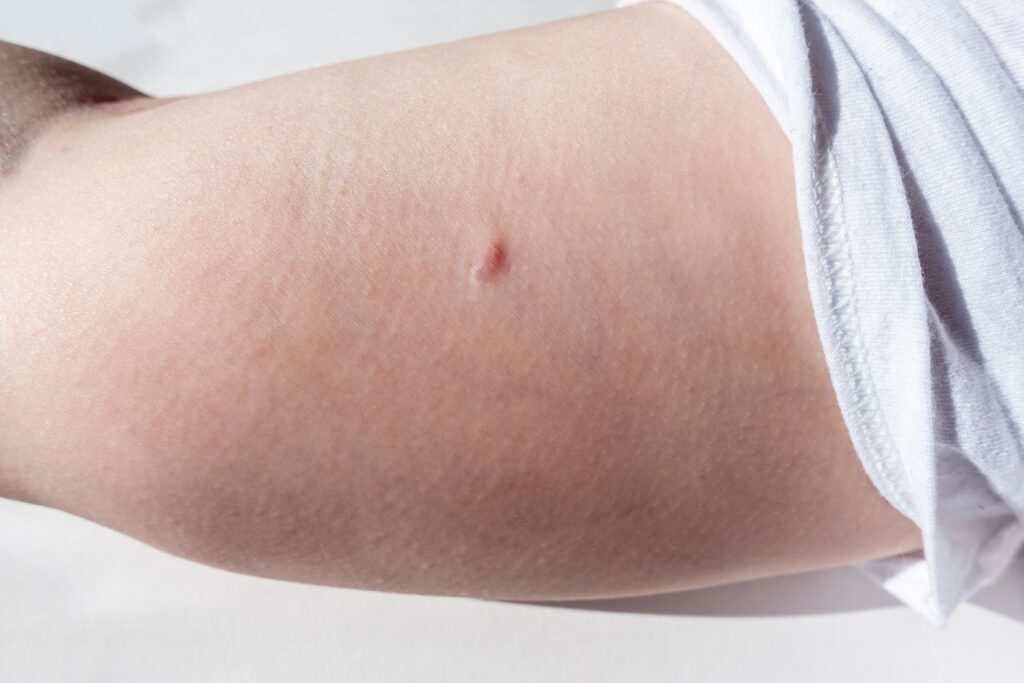
Nexplanon is a birth control implant that is placed in the arm. Nexplanon works more than 99 percent of the time. It is advertised as working just as well as the pill, but without the inconvenience of having to take a pill every day.
Nexplanon is an etonogestrel-based implant. Of course, any time a drug is involved, side effects are bound to occur. You may be wondering what the side effects of Nexplanon are.
Like any drug, Nexplanon can cause side effects. Some of Nexplanon’s side effects are minor, and some of them can be serious.
This article will go into detail about the side effects of Nexplanon.
The most serious side effect that has been linked to Nexplanon is blood clots.
A 2012 study found that the use of birth control implants that are placed under the skin such as Nexplanon is associated with a 40 percent increase in the risk of developing a blood clot in the veins.
Nexplanon received a label update in August 2015. The label update warned that using etonogestrel implants such as Nexplanon has been linked with reports of significant, potentially fatal blood clotting events, including deep vein thrombosis, stroke, heart attack, and pulmonary embolism.
Other side effects of Nexplanon include:
• Changes in your typical menstrual bleeding pattern
• Weight gain
• Mood swings
• Acne
• Headache
• Depressed mood
• Vaginitis (vaginal inflammation)
• Viral infections
• Breast pain
• Painful periods
• Stomach pain
• Back pain
• Mood swings
• Nervousness
• Dizziness
• Nausea
• Pain
• Pain at the insertion site
• Implant migration
• Ectopic pregnancy
• Ovarian cysts
• Gallbladder issues
• High blood pressure
• Rare noncancerous or cancerous liver tumors
Weight gain is listed as a potential side effect on Nexplanon’s official website. 13.7 percent of those who took part in Nexplanon clinical trials experienced weight gain.
A 2014 study found that those who used etonogestrel implants gained an average of 5.5 pounds.
A 2020 study found that those who used etonogestrel implants gained an average of seven pounds over an average of 27 months of use. The study also found that genetics may play a role in weight gain from etonogestrel implants.
However, research is mixed on this subject. A 2016 study found no evidence of weight gain from the short-term use of etonogestrel implants, and a 2014 review also found no evidence of weight gain related to etonogestrel implants.
Acne is listed as a potential side effect on Nexplanon’s official website. 13.5 percent of those who took part in clinical trials of Nexplanon experienced acne. Nexplanon affects levels of hormones, and this can cause acne.
Nexplanon usually lightens periods and can ease PMS and cramps, according to Planned Parenthood.
One in three people stopped getting their periods altogether after having Nexplanon implanted for a year, according to Planned Parenthood. It is safe not to have a period while using Nexplanon, according to Planned Parenthood.
Yes. Nexplanon implant migration is listed as a potential side effect on both Nexplanon’s official website and label. Nexplanon’s official website states that implants have been reported to be found in blood vessels, including blood vessels in the lung.
Nexplanon’s label warns that implant migration has been reported. It states that implant migration typically involves minor movement, and that when the implant moves within the arm, removal of the implant might necessitate minor surgery.
Nexplanon is reversible, and it will not affect long-term fertility or make it more difficult to become pregnant in the future, according to Planned Parenthood.
A 2018 study found no evidence of any negative effect on women’s ability to become pregnant following the termination of contraception use.
Nexplanon can cause spotting, or light bleeding between periods. According to the CDC, Nexplanon-induced spotting can be treated with NSAIDs or hormonal treatment with COCs or estrogen.
“Depressed mood” is listed as a side effect on Nexplanon’s official website. 5.5 percent of those who took part in Nexplanon clinical trials experienced depression.
Mood swings are listed as a potential side effect on Nexplanon’s official website.
Hair loss has been reported in Nexplanon users, and Nexplanon’s label mentions that hair loss has been reported by its users.
|
Nadrich Accident Injury Lawyers is no longer actively retaining Nexplanon victims. |
|---|
Nadrich Accident Injury Lawyers
800-718-4658

